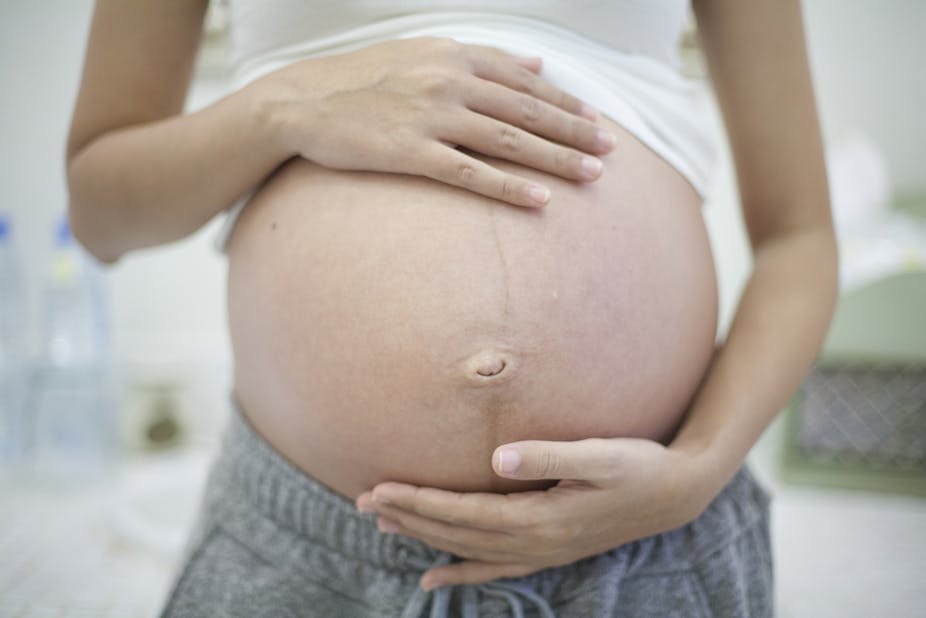The media chatter has finally subsided over Chrissie Swan and her naughty cigarette. And in spite of her misdemeanour, Chrissie’s baby will, in all likelihood, turn out just fine.
But as pregnancy surveillance intensifies, and with it, mother-blame and retribution, there is one group for whom these issues are far more significant than a minor celebrity’s moment in the spotlight. Nowhere is this blame game played out more intensely and persistently as it is for mothers of children with disabilities.
My 22-year-old daughter has a severe disability. I recall with anguish the time when my six-month-old baby’s brain abnormality was identified in a public hospital consultation, and her identity morphed then from miracle to mistake.
Her diagnosis was unclear, aetiology unknown, and it seemed I was guilty until proven otherwise. My interrogation began with: “Did you smoke? Take drugs? How much alcohol did you drink?”, along with a host of other questions about my pregnancy and lifestyle. These were repeated with each new referral to each new medical practitioner, all of whom felt entitled to pursue the same lines of inquiry.
“No,” I would answer, but my resolve seemed to falter with every encounter. After all, science promises perfect babies if mothers do the right thing, so where else can we point the finger of blame?
In her 2009 book, Reconstructing Motherhood and Disability in the Age of “Perfect” Babies, American anthropologist Gail Landsman draws attention to public health messages that reinforce the belief that child disability is the result of mothers’ misconduct. Once, the womb was seen as a safe haven for the developing foetus, but today, Landsman argues, it is seen as “permeable, vulnerable to the dangers delivered by selfish, careless women”.
Landsman refers to the US Centers for Disease Control and Prevention (CDC) website: “What YOU can do to Prevent Birth Defects”, and a poster distributed by March of Dimes (a child and maternal health organisation): “Three Ways to have a Healthy Baby”. These simplistic messages promise a healthy, normal baby for compliant mothers, and for the vast majority, this is a promise that will come true.
But not always. The stark reality is that while some environmental and social factors, in particular poverty, are implicated statistically, the causes of a large proportion of birth defects remain unknown (Landsman cites the figure given on the CDC website as up to 70%).
These public health messages diffuse into the social world. It’s not uncommon for mothers of children with disabilities to be asked questions such as these, by strangers: “Didn’t you have the test?”, “Was it a birth injury?”, or simply, “What went wrong?”

One participant in Landsman’s study described the shame she felt when she took her child out in public: “It’s hard … they look at my child thinking that I’ve done something wrong”.
Susan Kamata, editor of Love You to Pieces, a 2008 anthology of creative writing by parents of children with disabilities, comments that “pushing my daughter in her wheelchair to the grocery store sometimes feels like a political act”.
An overwhelming sense of guilt is normal among this group. Most of the 60 mothers in Landsman’s study reported persistent feelings of self-blame, although in none of these cases was the child’s disability found to be associated with maternal misconduct.
These mothers trawled through their memories of pregnancy to identify “bad” behaviours: “I had half a glass of wine on our anniversary, so I thought, oh, gee, that’s what did it”; “I took one Tylenol when I was pregnant. One, and it haunted me”; “I should have quit work earlier”; “I should have taken the elevator instead of the stairs”.
Such obsessive thoughts may seem irrational to an outsider, but for women like me, who have faced these demons, they have painful resonance. For a long time I was caught within this vortex of grief and self-blame, fuelled by the medical, social and cultural messages that devalued my child, and implied my failings. Even now, these fears can resurface from time to time and derail me.
While mother-blame may be on the increase, guilt and its cousin shame are not new for mothers of children with disabilities. In 1950, novelist Pearl Buck, winner of Nobel and Pulitzer Prizes, published The Child Who Never Grew, a memoir about raising her disabled daughter. She was the first prominent person to come out about having a child with intellectual disability. When her daughter Carol was nine, Buck placed her in an institution, the accepted practice at the time, where she would be “amongst her own kind”.
Buck agonised over the causes of her daughter’s disability, in the days when even Down syndrome was attributed to maternal stress or inappropriate behaviour. Finally, ten years after the publication of the book and unfortunately too late to help Carol, the cause of her disability was identified: it was phenylketonuria (PKU).
Today, PKU is routinely tested for at birth, and it is remediated mainly through dietary supplements. PKU is a recessive genetic disorder. While Pearl Buck’s genes may have been involved, her behaviour played no role in her daughter’s condition.
So while science continues to make strides forward in unravelling the mysteries of reproduction, the mother-blame game rushes on with gathering momentum. But it’s a dangerous game, and there are no winners: it generates fear and guilt, and it contributes to the stigmatisation of children with disabilities and their mothers.

